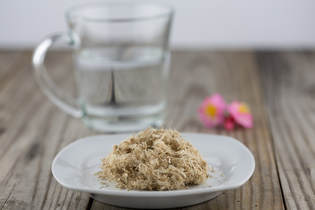Should you take a supplement to improve your gut health?
My personal preference when trying to improve my own health is always to focus on the foods I eat on a daily basis first. In fact, I'm really not very good at taking supplements, although I do try hard to at least take my multi-vitamin and magnesium supplements every day.

When it comes to improving your gut health, the most important first step is to eat a wide variety of fresh fruits and vegetables. Sometimes though, if you aren't feeling well, you might want to do a little more to kickstart your gut health.
That's where supplements come in! *As always, check with your doctor to verify dosages and make sure their aren't any contraindications for you. This article is meant for educational purpose and not meant to diagnose or treat any medical condition. Also, what works for one person may not work for another, so always do your research and pay attention to how you feel. THREE TYPES OF SUPPLEMENTS THAT HELP IMPROVE YOUR DIGESTIVE HEALTH1. Supplements that Support Digestion
Digestive enzymes
Digestive enzymes help to break down and digest food. When the body’s digestive enzymes are not functioning properly – whether due to stress, inflammation, or some other reason – they can be used temporarily to help with digestion or to break down hard-to-digest foods. With the help of enzymes to completely break down proteins, complex sugars, and starches, intestinal inflammation can be reduced. Digestive enzymes can be derived from fruit isolates, animals, or plants. These supplements can include any combination of enzymes, including proteases to break down proteins, lipases to break down fats, and amylase and other enzymes that help to break down carbohydrates. A full spectrum supplement will contain a combination of all the types of enzymes, whereas supplements formulated with specific enzymes, support the body in breaking down specific foods. For example if you know you have a gluten or dairy intolerance, you can look for a formula that helps with that specific issue.
Betaine HCL/pepsin This supplement increases the amount of hydrochloric acid in the stomach to help break down food. If you read my article on heartburn, you'll know that it's a common myth that heartburn is caused by too much acid. It's much more common to have too little acid in the stomach. This supplement must be taken with some form of protein, which is why pepsin (the enzyme that breaks down protein) is often included. Betaine HCL/ pepsin is used for low stomach acid. ***This supplement must only be taken under the supervision of a medical practitioner, as there are many contraindications. In particular, individuals with ulcers, those who take anti-inflammatory drugs, or anyone who experiences a burning sensation should not take this supplement. Apple cider vinegar is a great alternative to Betaine HCL as it helps increase stomach acid and has a host of other health benefits as well!  Bitter orange digestive Bitter orange digestive
Digestive bitters
Bitters can be foods or herbs with a bitter flavor. These stimulate the body’s natural digestive juices and the production of stomach acid. The western diet doesn't contain many bitter flavors which is why it can be helpful to supplement. Bitter flavors can also:
2. Supplements that Support Healthy Gut Flora
Prebiotics
Prebiotic fiber is food for bacteria. Prebiotic fiber is essentially the indigestible fiber found mostly in vegetables and seeds, which is always the best way to consume prebiotics. That's one reason why a diet high in fiber is beneficial. But sometimes if you feel like you're having a hard time getting enough fiber in your diet, you might consider supplementation. Be careful if you think you might have small intestinal bowel overgrowth (SIBO) or irritable bowel syndrome (IBS) as prebiotics can be irritating for individuals with those conditions. For more information on probiotics from natural sources click here.
Probiotics
Probiotics can help you maintain an already healthy gut or can help you rebuild your gut after a course of antibiotics or after some other type of disturbance (such as modern life). The greater the variety of strains, the better. The amount and type of probiotics you're taking can vary based on the reason you're taking them. Depending on the symptoms you're experiencing, you may want to see your doctor first. For more information on probiotics, click here for Probiotics Demystified Part 1 and here for Probiotics Demystified Part 2. And be sure to download the Probiotic Resource Guide. 3. Supplements that Nourish the Gut Lining
L-Glutamine
L-glutamine is an amino acid that's used for repair of a compromised gut. It helps to nourish and rebuild the gut lining, which is especially important if you think you might be suffering from leaky gut, read more about leaky gut here. L-glutamine has a host of other benefits including boosting your immune system and enhancing your recovery from aerobic exercise.
Methylsulfonylmethane (MSM) MSM provides biologically active sulfur, which is a mineral that can help reduce inflammation and rebuild tissue. Sulfur is the fourth most plentiful mineral in the body and is needed for many critical functions. MSM also improves immune function and is a popular joint health supplement.  Slippery elm is a mucilaginous herb used to help to soothe the digestive tract Slippery elm is a mucilaginous herb used to help to soothe the digestive tract
Mucilaginous Herbs These herbs typically have a mucus-like quality. They swell and become gel-like in water. This helps with inflammation of the digestive tract. Mucilaginous herbs can be used to help move stool or soothe irritation. Some examples are slippery elm, aloe vera, marshmallow root, and plantain.
Magnesium
Magnesium helps with detoxification. It's often paired with glycinate (an amino acid), which can make it easier to absorb and assimilate. This makes magnesium glycerinate the best form for you if you think you might be deficient (many people are). Magnesium citrate is a good form to take if you have any issues with constipation. There are many supplements that will help improve your digestive help. I've written a Supplement Questionnaire to help you find good quality supplements. Click the image below to download.
***Please remember to speak with your doctor before adding any new supplements. This article is only meant to be a guide or conversation starter with your doctor.
Ask questions or share your success stories below!
|
Click below to join my FREE Facebook Group-
Women's Wellness Circle: Create Your Extraordinary Life AuthorHi, I’m Crystal! If you'd like to access my Farmer's Market Friday posts from 2018, click here!
Categories
All
|



 RSS Feed
RSS Feed